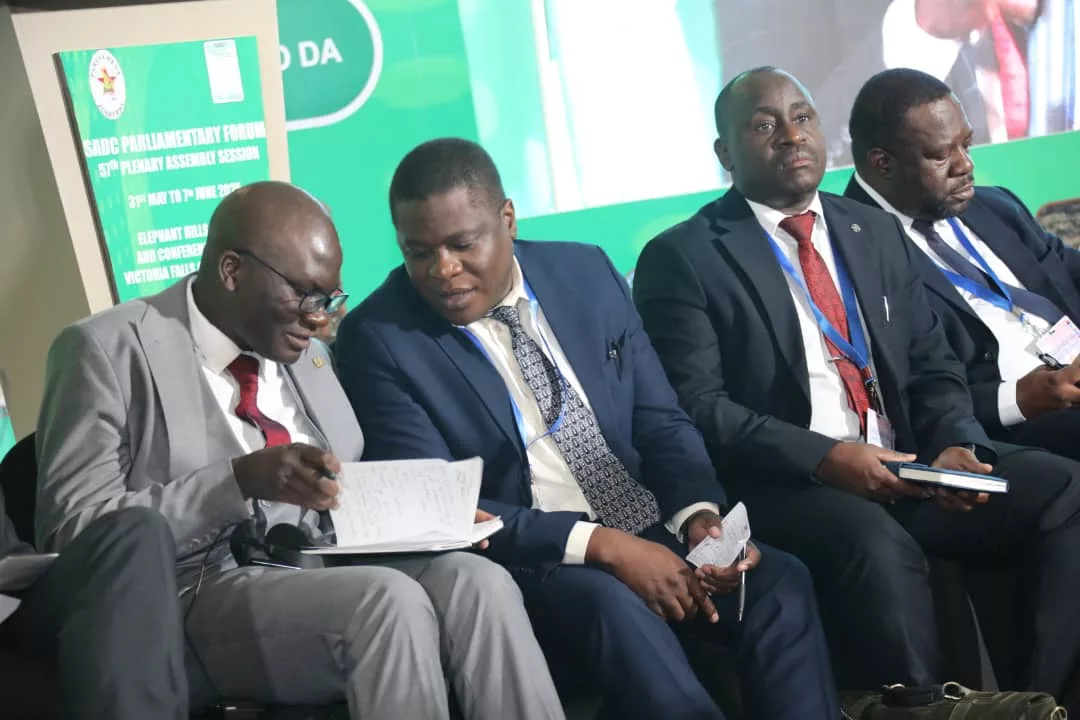Technological cooperation and knowledge sharing are meant to strengthen democratic institutions across the region, President Emmerson Mnangagwa said while officially opening the 57th Plenary Assembly of the Southern African Development Community Parliamentary Forum (SADC PF) today in Zimbabwe’s resort city of Victoria Falls.
He said the Fourth Industrial Revolution, characterized by a fusion of emerging technologies, is blurring the lines between the physical, digital, and biological sectors while cyber-physical systems have proliferated in all facets of society and economic activity within Africa and beyond, anchored on Artificial Intelligence (AI) and innovation.
For SADC Parliaments, President Mnangagwa said the potential benefits of artificial intelligence and innovative technologies are multi-pronged; offering solutions for resource optimization, which will in turn enable regional Parliaments to achieve greater results.
The SADC Chairman said technology can bridge the gap between parliamentarians and citizens in geographically dispersed constituencies. This will enable more direct and frequent interaction, thereby improving representation, accountability, and involvement of grassroots communities in parliamentary processes.
“Many SADC countries have multiple official languages. Hence, new technologies must be leveraged to support more inclusive parliamentary communication for easier translation and I, therefore, urge Parliaments to embrace artificial intelligence and other technologies to revolutionize legislative processes for more evidence-based and people-centered policies.
“As the Fourth Industrial Revolution transforms the world, it is critically important that all socio-economic sectors accordingly adapt, including parliamentarians. It is in this respect that the SADC Heads of State and Government, within the framework of the SADC Regional Indicative Strategic Development Plan (2020-2030), are prioritizing the development of appropriate skills related to information communication technologies. Equally key, is the need to enhance the accessibility to new technologies, as well as promote investment in research and development to boost afro-centric innovation and digital transformation,” President Mnangagwa said.
He added that various Parliaments in the region are at varying stages of ‘digital maturity’ hence diversity of experience creates a rich environment and ecosystem for collaboration.
The President said cross-border technology sharing and investments must also be encouraged towards strengthening interconnectivity and lowering tariffs for the benefit of people.
He reiterated that policies concerning ICT enablers and new technology uptake should leave no one and no place behind.
The Government of Zimbabwe, through the “Whole of Government approach”, is scaling up the integration of digital solutions into the governance frameworks. To date, Zimbabwe has established Innovation Hubs and Industrial Parks across all its universities. These centres of excellence are advancing the technological agenda and remain at the forefront of the country’s innovation efforts.
Partnerships with universities, research institutions, and industry to promote digital literacy, stimulate local content creation, and advance research in new technologies, including artificial intelligence are providing most valuable.
At a national scale, the adoption of Artificial intelligence and other emerging technologies must enhance rather than compromise the integrity and independence of our democratic institutions. To this end, measures must be put in place to deal with issues of cyber-security, data protection, digital sovereignty, and the potential for technological dependence, among others.
Zimbabwe has enacted the Cyber and Data Protection Act to regulate data security and ensure fairness in data related to, and services driven by Artificial I intelligence. Additional legislation and governance frameworks to address ethics and accountability.
In his address, Hon Jacob F. N. Mudenda, the Speaker of Parliament of Zimbabwe expressed optimism that the envisaged Protocol which will give effect to the transformation of the SADC Parliamentary Forum into SADC Regional Parliament will be consummated at the August 2025 45th SADC Summit to be held in Madagascar.
The Speaker said in sync with the theme of the Plenary Assembly, the Parliament of Zimbabwe, indeed all SADC Parliaments, are challenged to embrace the use of Artificial Intelligence and other emerging digital technologies in their Parliamentary processes.
“Accordingly, the 57th Plenary Assembly looks forward to the guidance of our Guest of Honour and the outcome of the said symposium on how best to navigate the employment of AI and innovation in our Parliamentary process in the SADC region,” Hon Mudenda said.






